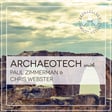
Archaeology and Big Data with Parker VanValkenburgh and Andy Dufton - Ep 133
Paul and Chris have been saying for years that there is no digital archaeology because that implies there is archaeology that does NOT have a digital component. Well, that just doesn't seem to be the case anymore. Our guests today, Parker VanValkenburgh and Andy Dufton helped bring a supplement about digital archaeology and the ethical considerations to the Journal of Field Archaeology. They come on today to talk about it.
Parker VanValkenburgh is an archaeologist whose research focuses on landscapes, politics and environmental change in the Early Modern World – particularly, in late prehispanic and early colonial Peru. He received his Ph.D. in 2012 from Harvard University and previously held positions at the University of Vermont (Assistant Prof. of Anthropology, 2013-15) and Washington University in St. Louis (Mellon Postdoctoral Fellow in Modeling Interdisciplinary Inquiry, 2012-13). Among other projects, he is currently director of the Paisajes Arqueológicos de Chachapoyas (PACha) project, an investigation of long-term human-environment interaction in Peru's Chachapoyas region, grounded in the analysis of archaeological survey, archival research, remotely sensed datasets, and work with contemporary communities in the provinces of Luya, Chachapoyas, and Bongará, Amazonas (Peru). He is also a co-director of the GeoPACHA (Geospatial Platform for Andean Culture, HIstory and Archaeology). At Brown, he directs the Brown Digital Archaeology Laboratory and teaches courses on Geographic Information Systems, cartography, critical digital archaeology, the politics of space and landscape, historical anthropology, and the archaeology and anthropology of the Andean region.
Andrew Dufton is a Lecturer in Roman Archaeology and History at the University of Edinburgh. He received his PhD in Archaeology from the Joukowsky Institute for Archaeology and the Ancient World at Brown University, and previously held a position as a Visiting Assistant Professor at NYU's Institute for the Study of the Ancient World. His research interrogates the long-term dynamics of urban change in North Africa, from the Iron Age into late antiquity. This work highlights the diversity, haphazardness, and improvisation that best characterise urban life in both ancient and modern contexts. He has excavated and surveyed at sites in the US, the UK, and across the Mediterranean, including acting as surveyor and geospatial data manager at the imperial villa and medieval monastery at Villa Magna (2006–2010); at the Tunisian city of Utica (2011–present); and with Brown University at Petra, Jordan (2012–14).
Links
- Journal of Field Archaeology
- Brown Digital Archaeology Laboratory
- Implementing a Tablet-Based Recording System for Ceramic Classification
Contact
- Chris Webster
- Twitter: @archeowebby
- Email: chris@archaeologypodcastnetwork.com
- Paul Zimmerman
- Twitter: @lugal
- Email: paul@lugal.com
- Parker VanValkenburgh
- Email: parker_vanvalkenburgh@brown.edu
Affiliates
